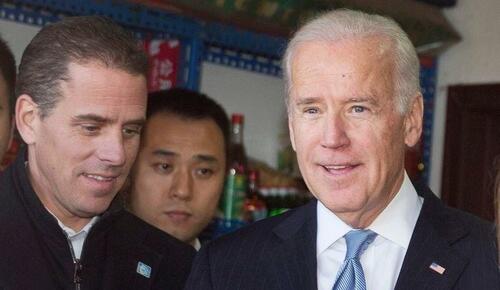Newly declassified memoranda show then-Vice President Joe Biden’s staff intervened in February 2016 to block the Central Intelligence Agency from circulating an intelligence report to policymakers that summarized how senior Ukrainian officials perceived his son’s business dealings and his December 2015 trip to Kyiv.
According to the documents, the request came from the vice president’s national-security adviser and was relayed inside the intelligence community by Biden’s Presidential Daily Brief briefer: “I just spoke with VP/NSA and he would strongly prefer the report not/not be disseminated. Thanks for understanding.”
A senior CIA official described the intervention as “extremely rare and unusual,” saying the material otherwise met the threshold for distribution to U.S. officials working on Ukraine policy.
The report compiled reactions from officials in the government of then-President Petro Poroshenko following Mr. Biden’s visit. Those officials “privately mused” about U.S. media scrutiny of Hunter Biden’s business ties in Ukraine and “viewed the alleged ties of the U.S. Vice President’s family to corruption in Ukraine as evidence of a double-standard within the United States Government towards matters of corruption and political power,” the CIA relayed. The same officials “expressed bewilderment and disappointment” that the vice president did not engage in expected substantive discussions with Mr. Poroshenko or other senior figures, Just the News reports.
At the time, Biden had been designated President Barack Obama’s point person on Ukraine policy after the Maidan Revolution and Russia’s seizure of Crimea. His December 2015 trip has drawn scrutiny because the vice president decided then to press for the dismissal of Prosecutor General Viktor Shokin, warning that a substantial U.S. loan guarantee would be withheld if the move wasn’t made. Mr. Shokin was investigating Burisma and its owner, Mykola Zlochevsky; Hunter Biden had formally joined Burisma’s board in May 2014.
Prior to the trip, then-U.S. Ambassador to Ukraine Geoffrey Pyatt warned Mr. Biden’s top advisers that Washington considered Burisma corrupt. Mr. Pyatt later told his successor, Marie Yovanovitch, that Hunter Biden’s role “undercut the anti-corruption message the VP and we were advancing in Ukraine,” echoing what Ukrainian officials were thinking, according to the CIA.
A senior CIA official told Just the News that, in the agency’s assessment, the report merited dissemination at the time it was drafted and would have been useful to U.S. officials dealing with Ukraine because it reflected the views of multiple senior Ukrainian figures. It was also “extremely rare and unusual,” the official said, for someone outside the intelligence community to weigh in on whether to distribute such a product; typically that decision is made within the community. The documents offer no indication of how the vice president’s office learned of the report before intervening.
The memos surfaced after a review of CIA databases that began in late 2024 under the prior administration. CIA Director John Ratcliffe has framed the disclosure within a broader push to curb politicization: “Mr. President, the CIA is being restructured at your direction to focus on our core mission and to eliminate the political – the well-documented politicization that has taken place in the intelligence community from bad actors in the past to focus on our core mission and to Make America Safe Again,” he said at a Cabinet meeting in April. The senior CIA official said Mr. Ratcliffe views the 2016 intervention as part of that politicization and opted to release the document in the interest of transparency.
The episode also intersects with long-running debates over Ukraine policy. Just the News previously reported that Biden’s push to oust Mr. Shokin “broke” with State Department and European Union assessments that the prosecutor’s progress on anti-corruption reforms was sufficient to warrant new loan guarantees. Following that reporting, fact-checkers revised their narrative and concluded that Joe had “called an audible” aboard Air Force Two on the way to Kyiv, deciding to call for Mr. Shokin’s removal.
What remains uncontested in the newly released records is the unusual nature of the vice president’s office weighing in on an intelligence-distribution decision. As the senior CIA official summarized, the information would ordinarily have been shared - absent external intervention - because it captured contemporaneous thinking among Kyiv’s senior leadership about a visiting U.S. principal and the sensitivities surrounding his family’s business ties.
Loading recommendations...
